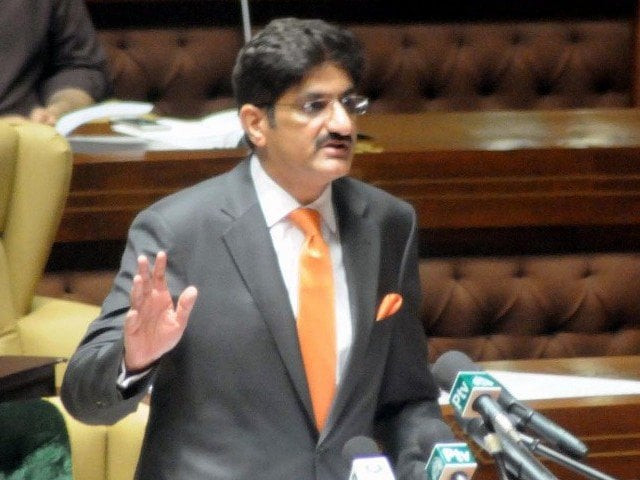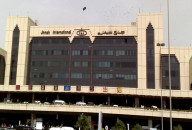Sindh unveils Rs2.2tr development-oriented budget
Rehabilitation of flood-hit people, protection of social sector main focus

The Sindh government on Saturday presented a Rs2.2 trillion budget, with a deficit of Rs37.79 billion for the financial year 2023-24.
An amount of Rs700.1 billion has been allocated for development projects, focusing especially on rehabilitation of flood-affected people and providing social protection to the poor people of the province.
Last year’s floods in Sindh had left over 12.5 million people homeless, according to Sindh Chief Minister Murad Ali Shah.
The total revenue receipts of the provincial government were estimated at Rs2,209.785 billion, representing an increase of 31.56% over the current fiscal year 2022-2023, against estimated expenditures of Rs2,247.581 billion that shows a deficit of Rs37.796 billion.
In his budget speech, Murad, who also happens to be finance minister, announced a 35 per cent increase in the basic salaries of government employees working in Grade-1 to Grade-15 and a raise of 30 per cent in the basic pay of Grade-17 and above employees. However, the pension has been increased by 17.5 per cent. The other adhoc relief would be the same as has been announced by the federal government.
"We have proposed a 35% increase in the minimum wage of Rs25,000 which would come up to approximately Rs35,550," the CM said.
1686461175-0/Economic-Survey(1)1686461175-0.jpg)
For the development-wise allocation, the government has earmarked Rs34.6 billion for education schemes, Rs19.73 billion for health, Rs25 billion for irrigation, Rs62.5 billion for the newly elected local bodies, Rs24.3 billion for public health and engineering, Rs12.5 billion for mega projects in Karachi.
"In the upcoming fiscal year, the total school education budget has been enhanced by 13.1% to Rs267.6 billion and health budget to Rs227.8 billion, denoting a 10.1% growth," the CM said.
Read Caretaker K-P govt to present 4-month budget
According to the budget papers, the estimated total receipts of the province include three revenue channels – current revenue receipts estimated at Rs1,823.126 billion, current capital receipts at Rs36.133 billion, and other receipts at Rs295.53 billion.
In addition to the revenue receipts, carryover cash balance is estimated to be Rs45 billion and net balance of public accounts of the province Rs10 billion, with Rs5,585.66 billion in receipts and Rs5,575.66 billion in disbursements for fiscal year 2023-24.
The current revenue receipts include a total of Rs1,353.2 billion in federal transfers in the form of revenue assignment estimated at Rs1,225 billion, straight transfers estimated at Rs64.42 billion, and grants to offset losses of the abolition of octroy and zila tax estimated at Rs33.74 billion.
In addition, the head of revenue receipts includes an estimated provincial tax receipts of Rs202.9 billion, provincial sales tax on services of Rs235 billion, and provincial non-tax receipts of Rs32 billion.
The current capital receipts include local repayments/loans estimated to be Rs6.133 billion and bank borrowing Rs30 billion.
Expenditures
In the budget papers, the provincial government has estimated a major chunk of the amount from Foreign Project Assistance (FPA) mainly for the rehabilitation of flood-hit areas.
Its estimated expenditure of Rs2,247.58 billion includes a current revenue expenditure of Rs1,411.2 billion, current capital expenditure of Rs136.26 billion, and development expenditure of Rs700.1 billion.
The latter includes provincial ADP excluding FPA of Rs380.5 billion, FPA of Rs266.7 billion, other federal grants of Rs22.91 billion, and district ADP of Rs30 billion.
Read more BISP budget increased by Rs40b
The new projects include connectivity of Lyari-Gujjar Nala in Central Karachi for Rs1.5 billion, construction of the Sea Wall and Road from Dolman Mall to China Port, Clifton for Rs1,430 million, the construction of a six-lane expressway way from the existing Jinnah Bridge along with Lyari Naddi to Hawkesbay, including a bridge crossing on the main Hawkesbay Road and a small bridge on navy maritime security jetty area, Keamari, for Rs1.8 billion, the construction of a 2+2 lane underpass at Karimabad District Central for Rs1.35 billion, and the establishment of campuses of public sector universities in Korangi, West, and Keamari for Rs4,000 million.
During his speech, Murad also announced an allocation of Rs63.0 billion to ensure a consistent supply of subsidised wheat to mills and affordable wheat flour to the public. He further gave a budgetary provision of Rs16.9 billion for the Pro-Poor Social Protection and Economic Sustainability Programme.
"The Sindh government was successful in attracting and securing Chinese grants worth Rs7,659 million for the rehabilitation and reconstruction of 646 schools," the CM said, adding that under the Flood Restoration Programme and Sindh Development through Enhanced Education Programme (DEEP), 112 damaged schools would be rehabilitated on resilient and environmentally friendly fabricated structures in five districts for Rs3,011 million.
In the budget books, a new scheme titled ‘Programme for Flood Response through Reconstruction of Education Facilities in Sindh’ in partnership with the Japan International Cooperation Agency (JICA) has also been proposed.
The share of the Sindh government is Rs142.410 million and has been proposed in the ADP (2023-24) for districts such as Mirpurkhas, Khairpur, Badin, SBA, Sukkur, Ghotki and Dadu. The share of JICA is estimated to be Rs1,424.218 million.
Transport
The transport budget has witnessed an impressive growth rate of 167.8%, rising from Rs5 billion to Rs13.4 billion. Similarly, the allocation for energy has experienced a notable increase of 57.8%, reaching a total of Rs47.9 billion.
Housing
The Sindh Housing Project was immediately launched in targeted areas for the rehabilitation of flood-affected people.
As of May 2023, the provincial government received $230 million equivalent to Rs64.669 billion under the projects. The amount was being expended on relief and rehabilitation activities.
Also read Govt bets on relief, amnesty
Other projects that support the people of Sindh in the flood-affected areas include $500 million Flood Emergency Rehabilitation Project, $500 million Floods Emergency Housing Reconstruction Project, $292 million Water and Agriculture Transformation Project, and $200 million Strengthening Social Protection Delivery System Project as well as $200 million Integrated Health and Population Project.
Law and order
Murad continued that the Sindh government prioritised the allocation of funds for law and order, and the interior department Rs143.568 billion for the next financial year, suggesting a 15% increase from the outgoing fiscal year’s allocation of Rs124.87 billion.
He also announced Rs15.5 million each to the prison's policy and management boards for strategic improvements and Rs463.414 million for strengthening the prison department's technical capabilities.
Empowerment of PWDs
According to the World Health Organisation, 15% of the world's population are persons with disabilities. They are found to be socially and economically discriminated segments of our society.
The provincial government was “determined to extend support through imparting vocational education, IT skills and supplying assistive technology with artificial intelligence applications to empower them to contribute to the developmental process”.
For this cause, Murad announced a provision of Rs6.1 billion for 2023-24 against the budget of Rs3.4 billion in the outgoing fiscal year 2022-23.
Women development
The Women Development and Empowerment Department’s budget is estimated at Rs705.983 million against the previous allocation of Rs644.125 million.
A provision of Rs500 million has been kept for the Benazir Women Agricultural Workers Programme. The programme will improve the agricultural output and living standards of rural women associated with the agricultural field.
Livestock
The chief minister announced an allocation of Rs10.987 billion for livestock and fisheries for the next fiscal year 2023-24 and a provision of Rs2.78 billion for non-development expenditure related to forest and wildlife against Rs2.45 billion in FY 2022-23.
It includes Rs368 million for the conservancy and development of new forest nurseries.
"My government will be able to earn $200-220 million - equivalent to around Rs63 billion - of carbon credits over the next two decades for its efforts to expand mangrove forests," he concluded the speech.



















COMMENTS
Comments are moderated and generally will be posted if they are on-topic and not abusive.
For more information, please see our Comments FAQ